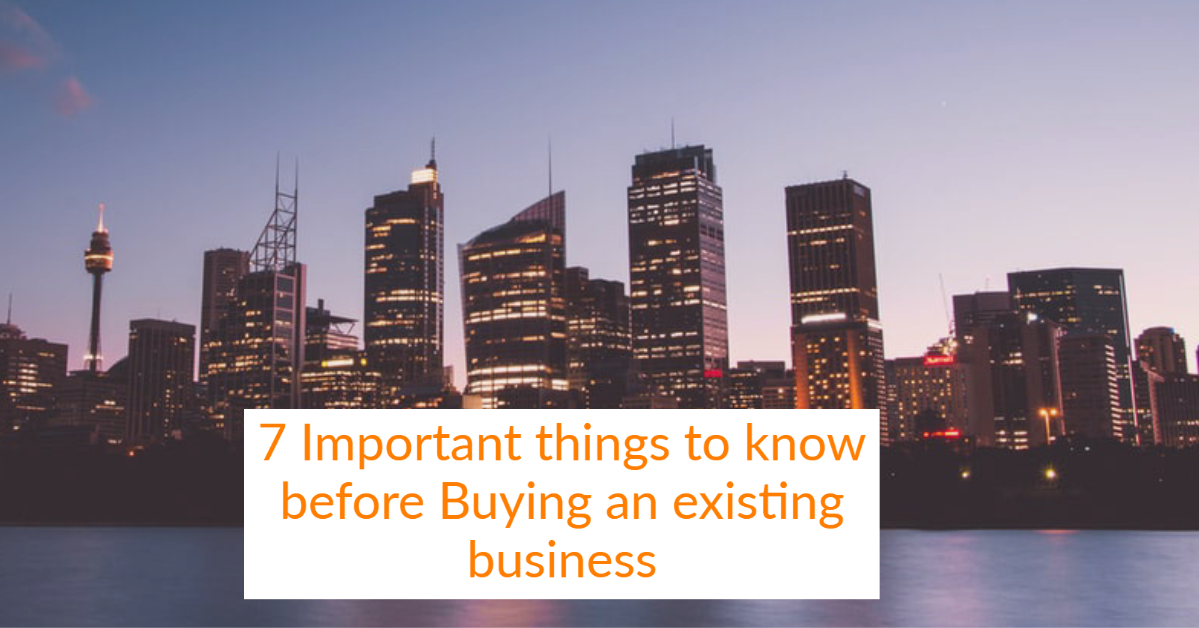7 Important Things to know before buying an existing Business
Published on 2020-01-27
Category: Business Growth, Small Business Owners, Business Strategy
Share via
We often come across small business owners or aspiring entrepreneurs who would like to buy an existing business rather than starting from the scratch. It could be a grocery store, a supermarket for sale, a small eatery or even a fashion outlet. This definitely puts them in a better spot as someone has already done the groundwork such as market research, market creation, customer profiling, branding, etc. and they can just take it from there and make it bigger by adding value to it.
But how does one decide which business to buy and how to go about it? There are various steps involved in buying an existing business and successfully running it. So, if you have decided to buy an existing business, consider the points below before taking the plunge.
1. Buying the right business
As they say the first step is always the hardest. You can make the decision to buy a business quicker than decide which business to buy. You might think it is best to buy a business you are passionate about; you might require more than that. Go for a business you have experience or knowledge about, wherein you can understand how it works and can make a decision when required, without much external dependence.
2. Businesses on sale
There are various ways to identify which businesses are on sale. You can check the newspapers for classified business on sale ads. There are also various website marketplaces, which will have listing of businesses on sale. You can ask around in your social network or even contact business brokers. After understanding your need, brokers help you with various business options, verify their economic health, and help you with paperwork. Most brokers charge a commission for their services, which is usually paid by the seller.
3. Understand why the particular business is on sale
There could be various reasons why a business is put up on sale. However, it is wise to know the reason, before making the decision to buy the particular business. Do a thorough background check to find out the reason. Many entrepreneurs sell their businesses due to losses, legal issues, debts and other significant challenges, which might be difficult to overcome. Try and speak to existing customers, employees, competitors, and other close watchers. That will help you gauge the business as an outsider as well as an insider and help you make an informed decision.
4. Choose a business which fits your goal, budget & resources
After a thorough research you would have received a lot of information about different business models and how they work. It is not just the interest or finances that play a major role in choosing the business you want to own and build. It is also about the commitment it requires, the time it will take to give you returns and how it will affect your physical, emotional and financial well-being. Don’t take this decision in haste. Take your auditor’s advice, talk to other small business owners, talk to people who have already bought existing businesses, research on the industry you are about to get into. See if it suits your goal and budget and also see if it excited you enough to push you to do your best. If you think you can add value to it and make it bigger than it is right now, go for the next step.
5. Documentation or paperwork
One of the most important yet tedious processes is to get the documentation right. Check and verify the papers with the existing owners. You can always seek legal help to go through the papers to find anomalies if any. Get your auditors to verify the financial statements, P&L statements, and bank statements along with company policies, your stake, employee information and other significant details, which might be of relevance to you and your plan of running the business. Once you are thorough with the documents and sure about the deal, you can evaluate the buying price.
6. Evaluate the business price
While you verify the P&L statements, you know the kind of money it is making. It gives you a rough idea of the liabilities and earnings, with which you can quote a price or evaluate the price quoted by the seller. Read the market well. See what’s the running price and how much are people willing to pay to acquire such a business. Measure the pros and cons. If there are debts, you can take that into consideration while quoting the final price. It is better to include a third-party consultant such as independent business valuation professionals who can arrive at an unbiased value and help quote a fair price, which is profitable for both the seller and the buyer. Also, you need to decide what you would do with the already existing assets of the business including its infrastructure, resources, people, clients and vendors. Some small business owners like to keep the resources intact and try to bring in changes to the existing systems to suit their agenda, while some like to bring in their resources, bring about a bigger organizational change and therefore remove older people retaining only a few key personnel, who can help understand the business and its processes.
7. Secure the capital needed to acquire the business
There are various types of small business loans available in the market which eases the burden of securing the large funds required to acquire an existing business. As the business is already existing and earning some profits, it is easier to convince the banks and other fintech companies to lend. However, if the business isn’t doing that well, banks might turn the application down or fintech companies charge a heavy interest. So, its better to understand your loan type and what details lenders look for when you apply for a business loan. You can opt for
a. Secured Business Loans – If you have decided to take a loan to acquire the business, you can opt for a secured business loan, by keeping your company assets or personal assets as a collateral.
b. Unsecured Business loans - If you don’t wish to keep any collateral or don’t have any, you can always opt for an unsecured business loan. These loans are available faster and are for relatively shorter terms, thus enabling you to get off the ground quickly and manage the initial stages of running the business.
If you have taken the first 6 steps and are exploring financing options, talk to us today and explore how we can help you with an Unsecured Business Loan.
Tagged in: Small business owners, Buying a business, Business buyers, Things to buy a business, Plan of buying a business, Checklist to buy a business
Visit us https://local.google.com/place?id=13208792946264494566&use=posts&lpsid=CIHM0ogKEICAgIDW-eHsDQ
Follow our Facebook page - https://www.facebook.com/capitalboostau
Recent Posts
Published on 2024-04-04
Understanding the Joint Business Loans: A comprehensive guide answering all your FAQs -2
Joint loans are versatile financial tools that can be utilized for a multitude of purposes. Whether it's funding a busin...
Published on 2024-04-04
Understanding the Joint Business Loans: A comprehensive guide answering all your FAQs -1
A Joint business loan entails having your business partner join you as a co-applicant on the loan application for your b...
Published on 2024-03-06
From Employee to Entrepreneur: Dos Before Taking the Entrepreneurial Leap
Embarking on the entrepreneurial journey is akin to setting sail on uncharted waters. While the thrill of creating somet...
Need Help?
Call our experts on 1300 360 530, or







